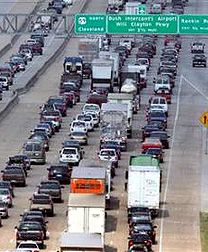 |
 |
 |
|
|
|
|
|
|
|
|
|
|
|
|
|
|
|
|
|
|
|
|
|
|
|
|
|
|
|
|
|
|
|
Posted 08/02/2006
Many coastal residents
say they will ignore evacuation orders |
 Twenty-eight percent of coastal South Carolina residents say if government officials order them to evacuate due to a major storm this season, they either would not leave or are unsure if they would leave. Dr. Jane Richter, director of the Center for Public Health Preparedness at the Arnold School of Public Health, says coastal residents who have transportation but choose to ignore evacuation orders probably do so because they don’t believe they will suffer significantly as a result. The numbers come from a study by Harvard School of Public Health researchers who polled 2,029 residents in eight states – Alabama, Florida, Georgia, Louisiana, Mississippi, North Carolina, South Carolina and Texas. An average of 33 percent of the residents in the eight states said they either would not leave or are unsure they would leave if ordered. All of the residents surveyed were in an area approximately 50 miles from the coast. Richter says that the Health Belief Model is one way to explain the behavior. “Simplistically, the model proposes that in order to act in the face of a threat, you’ve got to believe you’re susceptible to it and that failing to act will result in serious consequences.” “I do think the people on the coast believe they’re susceptible. What I don’t think some believe is that the consequences will be severe,” said Richter. If they survived hurricane Hugo relatively unscathed or hold a belief that public safety officials will miraculously come to their rescue should evacuation become necessary as the storm is bearing down, their choice may be to remain in their homes. Homeowners (39 percent), whites (41 percent) and long-term residents (45 percent) are the groups most likely to ride out a major hurricane. People with children under 18 are less likely to remain in their homes (26 percent). Mobile home owners are no more likely to evacuate than the general public. The top reasons people give for not evacuating involve concerns about safety and security. More than two-thirds (68 percent, S.C. residents 61 percent) say their homes are well-built and they would be safe there. About half (54 percent, South Carolina 50 percent) feel roads would be too crowded, and one in three (36 percent, South Carolina 36 percent) feels that evacuating would be dangerous. Close to one-third (31 percent, South Carolina 31 percent) worry that their possessions would be stolen or damaged. "It will be a challenge for public officials to convince many of these people to leave their homes because they view their homes as safe and evacuating as dangerous," said Dr. Robert J. Blendon, professor of health policy and political analysis at the Harvard School of Public Health. "In addition, most of those who plan on staying believe they would be rescued if they needed to be." Some 54 percent (South Carolina 58 percent) of all residents said they were “very” or “somewhat” worried that a major hurricane will hit their community in the next six months. Some 77 percent (South Carolina, 70 percent) said they were “very” or “somewhat” better prepared for a major hurricane in the next six months. Seventeen South Carolina counties were represented in the survey: Allendale, Bamberg, Barnwell, Beaufort, Berkeley, Charleston, Clarendon, Colleton, Dillon, Horry, Marion, Florence, Georgetown, Hampton, Jasper, Orangeburg, and Williamsburg. For more information: • Survey results from all eight states |
|
|
|
|
|
|
|
| Columbia, SC 29208 · 803-777-7000 · info@sc.edu | © University of South Carolina Board of Trustees | ||||